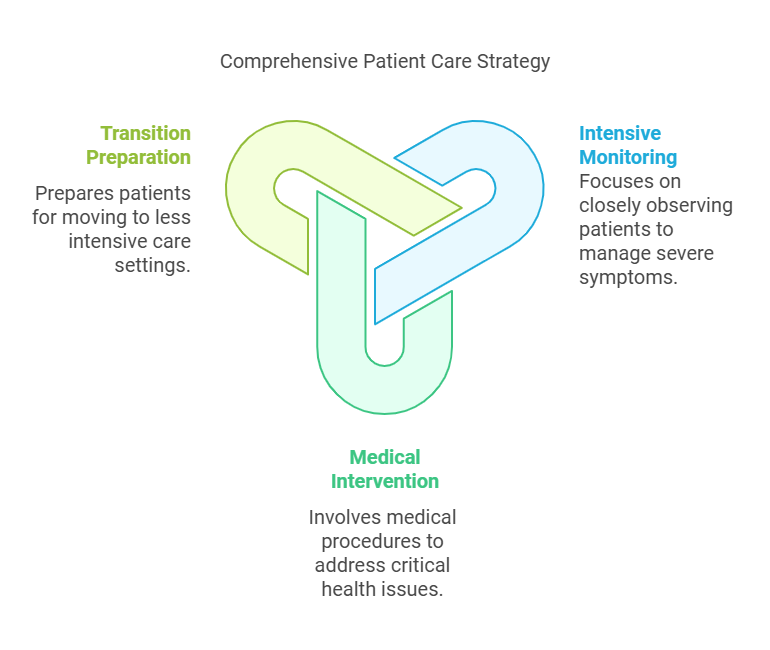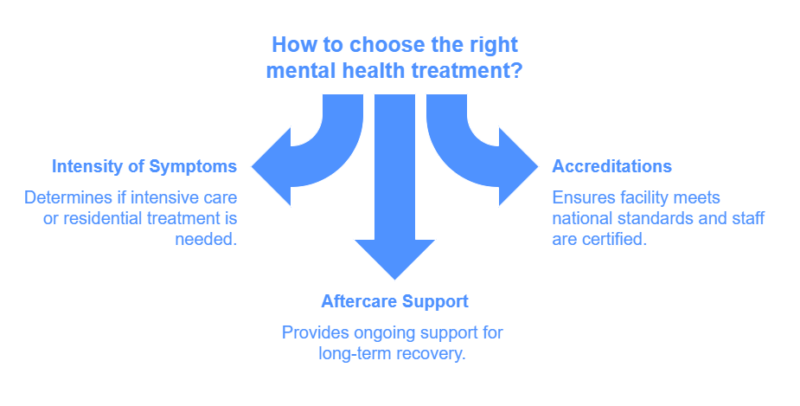Psych Ward vs Mental Hospital – What’s the Difference?
While terms like “mental hospital” and “psychiatric ward” may sound interchangeable, they serve distinct roles and cater to different patient needs. Let’s take a closer look at what sets them apart and why understanding these differences is vital if you or a loved one is considering professional help.
What Is a Psychiatric Ward?
A psychiatric ward typically refers to a specialized unit within a general hospital where patients receive inpatient care for acute mental health issues. This setting is equipped to handle emergencies and severe cases that require immediate and intensive treatment. Here’s how a psychiatric ward operates:
| Feature | Description |
| Short-Term Care | The focus is usually on stabilizing patients during an acute episode. The average stay might be relatively short, ranging from a few days to a few weeks. |
| Emergency Access | Located within general hospitals, psychiatric wards are well-suited for rapidly addressing severe mental health crises that may also involve other medical issues. |
| Multidisciplinary Approach | Patients benefit from a team that might include psychiatrists, psychologists, nurses, and social workers, all specialized in mental health care. |
*High levels of supervision and the use of sedatives are common, especially upon admission, to manage and mitigate any immediate risks to the patient and others.
Treatment Focus

The focus in a psychiatric ward includes:
- Providing short-term, intensive inpatient care that stabilizes the patient as quickly as possible.
- Intensive monitoring and medical intervention to address severe symptoms and prevent harm.
- Preparing patients for transition to other, less intensive care settings that focus on long-term recovery and rehabilitation.
What Is a Mental Hospital?
A mental hospital, or psychiatric hospital, is a dedicated facility providing inpatient care primarily for mental health services. Unlike a psychiatric ward, a mental hospital is not part of a larger hospital but a standalone center focusing on long-term care and rehabilitation for psychiatric illnesses. Characteristics include:
- Long-Term Rehabilitation: Mental hospitals often provide longer stays for patients, focusing on extensive treatment plans that address more complex and chronic conditions.
- Specialized Programs: These facilities may offer various therapeutic programs, such as residential therapy, long-term medication management, and comprehensive rehabilitation services.
- Holistic and Continuous Care: With the aim of holistic rehabilitation, these hospitals provide an environment tailored to foster recovery over months or even years.
Environment and Freedom
These hospitals often resemble a residential setting rather than a medical facility, which helps patients feel more comfortable and less like they are undergoing treatment.
Here, the approach is to encourage independence, allowing patients to engage in various activities and have a say in their day-to-day treatment plans, promoting a sense of normalcy and control over their recovery.
Types of Care Offered
In a mental health hospital, patients have access to:
| Program Type | Description |
| Residential Programs | Mimic a home-like environment to aid in longer-term recovery. |
| Partial Hospitalization | Provides a structured therapy program during the day, allowing patients to return home at night. |
| Intensive Outpatient Programs | Designed for patients who require therapy several times a week while maintaining their regular daily activities outside the facility. |
Admission Processes

Mental Health Hospital
Individuals check themselves in, often after realizing they need help to manage persistent or worsening symptoms over time. Admission is usually the result of careful planning and consideration, involving discussions with mental health professionals and loved ones.
Psychiatric Ward
Admission is typically rapid and in response to a crisis situation where the individual’s safety is at risk. The process is often initiated by a third party, such as family members or mental health professionals, when a person is unable to make safe decisions for themselves.
Treatment and Services Comparison

Although both settings provide comprehensive mental health services, their methods and environments differ significantly to cater to their respective patient populations.
Mental Health Hospital
- Focused on creating a supportive and less restrictive environment that fosters healing and independence.
- Offers a wide range of therapeutic activities designed to treat the whole person rather than just the symptoms.
- Patients are encouraged to participate actively in their recovery process, which can include group activities, therapy sessions, and personalized treatment plans.
Psychiatric Ward
- Emphasizes rapid medical intervention to stabilize severe mental health crises.
- The environment is highly structured to ensure safety and effective management of acute episodes.
- Treatment is more prescriptive and controlled, focusing on immediate symptom management and stabilization.
Stigma and Public Perception
Both types of facilities are often misunderstood, which can affect how people perceive and engage with mental health services.
Efforts to educate the public on the benefits and successes of mental health treatment are crucial to changing these perceptions. Campaigns and open discussions led by healthcare professionals and recovery testimonials can play a significant role in destigmatizing mental health care.
Indicators for Needing Inpatient Care
Inpatient facilities provide 24-hour support and structured treatment environments that are essential for managing acute mental health conditions. Recognizing signs of severe distress, such as suicidal thoughts or inability to cope with daily tasks, is critical for timely and effective treatment.
Other indicators include erratic behavior, intense emotional crises, or significant deterioration in personal care.
How to Choose the Right Treatment

- Intensity of symptoms: Assessing whether the severity of the condition warrants intensive, supervised care or if a more open, residential treatment is feasible.
- Accreditations and credentials: Checking that the facility meets national standards and that staff are properly trained and certified.
- Aftercare support: Ensuring the facility provides ongoing support after the initial treatment phase to promote long-term recovery.
Final Thoughts
If you or someone you know is considering inpatient care, understanding the distinct roles and benefits of mental health hospitals and psychiatric wards is the first step in the process. Making an informed choice can lead to better outcomes and a more positive treatment experience.
